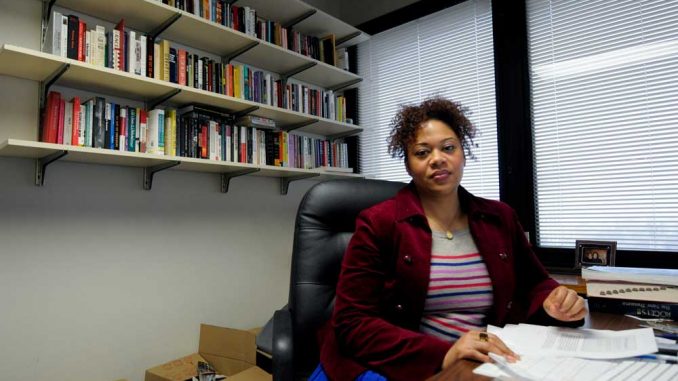
Though professor Niambi Carter didn’t realize it at the time, the program she graduated from in 1999 changed the shape of minority studies in academia: Temple’s African-American studies department.
Beginning in Fall 1988, Temple was the first university in the world to offer a doctorate in the subject. This fall, the university will celebrate 25 years since the first doctoral class began.
For years, students have enrolled in a department formally made, according to the department website, “to provide an intellectual arena in which students learn to critically examine, analyze, interpret and affect the experiences, traditions, and dynamics of people of African descent and by extension, develop a fuller understanding of humankind.” With class topics that vary from black people in cinema, race and poverty, race and society, and others, the department has grown itself to include a wide array of topics that affect the black community.
Dean Teresa Soufas of the College of Liberal Arts, which the African-American studies is part of, has worked throughout the years to continue this growth using yearly faculty searches to expand the department.
“Diversity is the backbone of a department such as this,” Soufas said.
In a department where, to use Carter’s example, a psychologist, a historian and a political scientist are all neighbors and interact every day, diversity and different perspectives are a valuable commodity.
With more than 1,800 students enrolled every year in the department, the diversity of the department is a growing factor in its importance. The department also sponsors annual events, such as African-American History Month, Africana Women’s History Month, the Graduate Student’s Conference and the Undergraduate Research Forum.
The department is historically important, but what makes it unique is the students who come to this school from all around the country and world to enroll.
Timothy Johnson, a member of the original class of doctoral students, called the program a “totally revolutionary experience.”
“I came to it because it was about me,” Johnson said.
Every college student thinks about majors and it usually comes down to interest and employment. Carter talked about the idea of African-American studies as a non-practical discipline.
“I think some people consider it a cast-off,” Carter said. “It’s not economics or psychology.”
But if you ask the students, they see this department as an entryway into a history some feel wasn’t presented to them in their youth.
“I didn’t get much knowledge in African-American studies in elementary and high school,” Javonna Hines, a freshman African-American studies and film major, said.
Kufere Laing, a sophomore African-American studies and economics major, said he feels black history – his history – wasn’t reflected in his high school education. Coming to college gave him a chance to learn what he hadn’t before.
The majority of these students said they wanted to learn about the history that wasn’t recorded in the history books they used as children. They feel that black history should be taught.
“I felt it’s necessary that to function as a black person in America, you have to have some sort of knowledge about your history,” Hines said. “I’m trying to start a revolution. We can’t do that if we don’t educate ourselves on our own history.”
“I think this type of education is critical,” Laing said. “You can’t offer true education with different perspectives.”

Soufas said she hopes that those students who long for a critical part of history will be sated when they come to Temple. She added that she sees the purpose of the curriculum is to provide a “deep knowledge of the subject,” along with “sensitivity to social, political, cultural and global issues.” All, she said, so that this sensitivity and knowledge can come together.
Soufas said there are no plans on how to celebrate the doctural program’s silver anniversary yet. She encourages faculty to come to her with ideas on celebrations. However, she has offered plans for hopeful collaborations with other departments to raise funds and celebrate properly.
“We can make this a college [celebration], not just a departmental one,” Soufas said. “I would love to see Temple embrace this celebration.”
Teachers like Carter understand the desire and importance of this subject.
“Students do want this information,” Carter said. “It does serve a purpose. It’s a real need.”
Omari Coleman can be reached at omari.coleman@temple.edu.


Be the first to comment